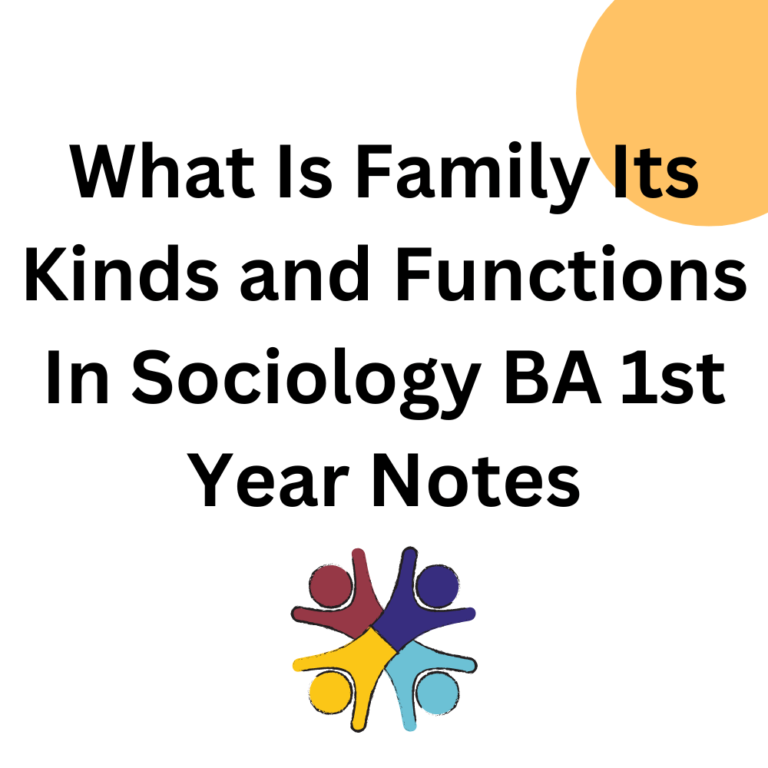What Is Family Its Kinds and Functions In Sociology BA 1st Year Notes: The family is the most functional of all institutions in society it is a system of organised relationships and a way of meeting basic needs.
Basically family fulfils the following functions
- Satisfaction of sex needs.
- Socialization.
- Procreation and rearing of children
- Provision of economic maintenance and livelihood.
- Provision of love, affection and security to the individual.
But before describing it one has to understand what family is many sociologists have given different definitions for it.
Burgoss and Locke: Family is a group of persons united by the ties of marriage blood or adoption; consisting of a single household, interacting and inter-communicating with each other in their respective social roles of husband and wife, mother and father, son and daughter brother and sister creating a common culture.”
Davis: “A family is a group of persons whose relations to one another are based upon consanguinity and who are therefore kin to another.”
Keller: Family is a “miniature social organisation, including at least two generations and is characteristically formed upon the blood bond.”
Clare: Family is a system of relationship existing between parents and children.”
M.F. Nimkoff: says that “Family is a more or less durable association of husband and wife for without child, or of a man or woman alone, with children.»
Eliot and Merrill: Family is “The biological social unit composed of husband, wife and children.
Maciver: Family is a group defined by sex relationships sufficiently precise and enduring to provide for procreation and upbringing of children.
The family is the most important primary unit in society. It is the simplest, most basic social environment to which a child is exposed. The family as an institution is universal and permanent in all social institutions.
Type of Forms of the Family
Families may be classified on various basic:
- On the basis of authority, the family can be classified into two main type
(a) Matriarchal family, and
(b) Patriarchal family
- In basic marriage family has been classified into three types:
(a) Polygynous family
(b) Polyandrous family, and
(c) Monogamous family,
- On the basis of residence, it has been classified
(a) Patrilocal
(b) Matrilocal
On the basis of blood relationships, a family may be a conjugal family or a consanguineous family.
The family as a basic social institution has been undergoing change. Modern family radically differs from that of the traditional one but still, family as an institution is universal.
Family possess distinctive feature it influences the entire life of the people the main distinctive features are:
Universality:
Murdock has studied 250 societies and analysed that family is a universal institution in the history of man. There is no society in which we are of family. Do not find one or the other form of family. Each person is a member of any form
Emotional basis:
The basic unit of the family is surrounded by emotions and sentiments. It is based on the impulse of mating, procreation, devotion and parental care. It is built on bonds of love and friendliness.
Limited size:
The family is small in size if it is a primary group. It is a Primary group. It is defined by biological conditions.
Formative Influence:
The family is the earliest influence in which nursery of human nature. surrounds the members. It helps in moulding the character of individuals. It is the nursery of human nature.
Nuclear Position:
Family is the nucleus of all the other organizations The wholecial I structure is built on family units.
Responsibility of the members:
In a family each person has responsibilities and he is obligated to obey them. The feeling of cooperation slows. It is a means of socialization, where a child learns to develop his personality.
Social Regulations:
Social taboos customs and social and legal regulations guard the family. It is not easy to violate them.
Permanent and Temporary Nature of Family:
The family is an institution based on the emotional nature of man, it continues to exist.
Functions of the family
Family as a social institution performs many functions. Various sociologist as well as many scholars have given their different views regarding the functions of the family.
K. Davis talks of four functions of family
- Reproduction
- maintenance
- placement
- socialization.
Ogbun and Nimkoff have divided the family into six functional units :
- Affectional
- Economic
- Recreational
- Religious and
- Protective
- Educational.
MacIver has divided the functions of the family into two types
- Essential
- Non-essential
Under essential he includes the stable satisfaction of sex needs, production and rearing of children, and provision of home. Under non-essential he includes religious education, economics, health and recreation. The main and important functions of the family are
Stable satisfaction with sex:
The sex drive is irresistible and it is necessary to get it fulfilled to build one’s personality. The satisfaction of sex instinct makes for a normal personality.
Manu the Ancient layer and vatsayana, the author of ‘Kamasutra* regarded sexual satisfaction as the aim of family.
Procreation and rearing of children:
The result of procreation is reproduction Hindu scriptures and religious books hold that man cannot fulfil his activities like fulfilling rinas unless he has a son. This family introduces legitimacy to the act of reproduction. Just the production of a child does not make him grow up. He needs nature and care because he is helpless. At the time of birth.
Family as an agent of socialization:
Family as a unit transfers its culture to its coming generation. Thus is a unit of cultural transmission. It is also an agent of socialization, Socialization is a process where a child internalizes the norms of one’s group and emerges as unique to the individual.
Economic function:
It fulfils the material needs of individuals. In the traditional family, most of the goods for consumption were made at home. Today the importance of family as an economic unit has been lessened as most of the goods for consumption including food are purchased.
Religious function:
The family is the centre for the religious training of the children. Olden times families performed different practices like idol worship, Yojna, and religious discourse. But now due to secularization, there have been changes in the role of religion.
Statement That Animals Have Society But No Culture Notes BA 1st Year




1 Comment
Pingback: Advantages And Disadvantages Of Joint Family System